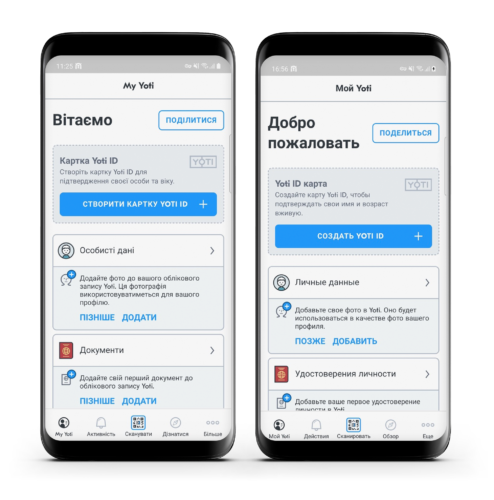
The past few weeks have seen the largest movement of people in Europe since World War II, with millions fleeing the war in Ukraine in search of safety, and many more trapped or under siege, unable to leave. While food, water and medicine are among the more immediate needs, many people have been forced to flee without identity documents as they get lost, misplaced or potentially confiscated along the way. While the situation remains fluid, humanitarian organisations are reporting the lack of any form of ID as a growing problem as people arrive at border crossings seeking help. In the longer term, the lack of ID can hinder visa applications, or potentially make moving back harder when it’s finally safe to return home.
However, this is only part of the problem. Large numbers of local and foreign volunteers and workers are responding to the emergency, and in many places there’s a growing need to verify the identity of drivers or aid workers providing help and support. Reports of donated goods and supplies – and worse, women and children – going missing are already beginning to emerge. With vast numbers of vulnerable people congregating around borders, the potential for a huge humanitarian disaster is very real and incredibly worrying.
For the past few weeks, we’ve been speaking to an increasing number of humanitarian NGOs, and collaborating with friends at TechFugees. Within days of war breaking out, many of the organisations in their network began reaching out to ask about our digital identity solutions, and how they might help those responding to the humanitarian crisis mitigate against some of these risks, or help citizens fleeing the war to secure their identities. We’ve been doing all we can to provide support to any organisation keen to implement our technology, which we’ve been providing for free. We understand how important it is to help them streamline the flow of humanitarian aid in times of crisis and to ensure that those delivering it are who they say they are.
As part of our efforts to help anyone in the country who wants to safely store and secure their identity documents, we’ve fast-tracked the translation of the Yoti app into the two most widely spoken languages in Ukraine – Ukrainian and Russian. The app, with this new language support, is now available in the App Store and Google Play stores and free to download by anyone in or from Ukraine worried about losing the ability to prove who they are, either now or in the future.
A short information sheet has also been introduced to explain the potential benefits of digital identity to them.

Yoti in the humanitarian sector
Thanks in large part to our social purpose efforts over the past few years, we know there are countless opportunities for Yoti to support the wider humanitarian sector, who can use our solutions often for free or at a heavily discounted rate. Operational uses may include verifying someone’s personal details when they sign up as a volunteer, confirming the identities of people accessing critical humanitarian data, or verifying that someone who claims to work for an aid agency does actually work for them.
For people fleeing war or conflict who try to enter neighbouring countries or apply or register for help, securing their identity digitally is likely to prove hugely beneficial. Outside of any emergency use, Yoti can also be used to register patients for health programmes, identify people before making cash payments, registering and assisting refugees accessing camp services, or to clock teachers and pupils in and out of school. You can find more about our wider offering to the charity sector here, or on our broader social purpose efforts here.
Planning ahead
While we’re doing all we can to support the humanitarian response in Ukraine, we recognise our efforts are more reactive than proactive. Naturally, humanitarian crises can be hard to predict and the scale of what’s been taking place across the country has even taken many of the aid agencies working there by surprise.
While we’re still learning about how digital identity solutions can support current efforts, it’s important to be as well prepared as possible before the next crisis strikes, and that means striving to always understand the most immediate needs of humanitarian relief organisations when they first hit the ground. What might they need from a company like Yoti to help them better understand what we offer? Would it make sense for us to ‘package up’ some of our solutions so they’re ready ‘off-the-shelf’ to meet some of the earliest needs, such as issuing digital ID cards to aid workers or volunteers? Should they have time before fleeing their homes, how do we help vulnerable people understand the very real benefits of securing their identities digitally?
As our response to events in Ukraine is ongoing, there’s still a lot we don’t know. We’ve made the decision to hire a consultant with deep humanitarian crisis experience to help us unpick what we’ve been doing, and to help us gain valuable insight into how we can do it better for those that might benefit the most.
The global response to the war has been incredible and it’s been encouraging to see so many people and organisations step up and help. As a company committed to doing good, and with technology with the potential to help the most vulnerable, it’s only right that we put ourselves among them in whatever way we can.
If your organisation is working in Ukraine or one of the bordering countries, and you’re interested in how our digital identity solutions might help in your crisis response, please feel free to email social.purpose@yoti.com and one of the team will get straight back to you.
It goes without saying that our hearts go out to all those affected by events in Ukraine, and we pray for a speedy end to this horrific and unjust war.
Ken Banks
Head of Social Purpose at Yoti
